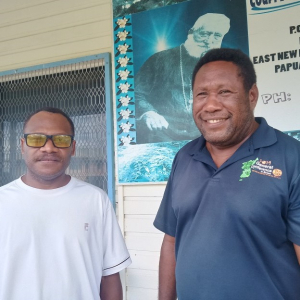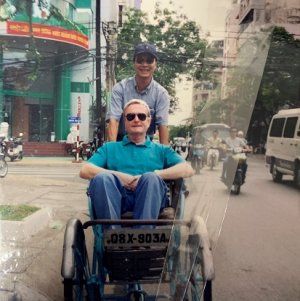Peter MALONE
Portrait of the Queen
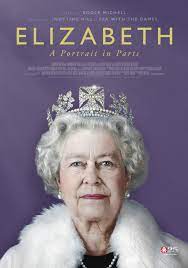
PORTRAIT OF THE QUEEN
Italy, 2022, 77 minutes, Colour.
Narrated by Charles Dance.
Directed by Fabrizio Ferri.
It could only be one queen: Queen Elizabeth the second. The film was made prior to her death but has an epilogue dedication to her memory.
So, the Queen herself would be a principal reason for seeing this film for those devoted to her into those interested in her world influence in the 20th century. However, there is another appeal, to photographers, professional and amateur, because this documentary provides an overview of photography portraits during 100 years, 90 of them encompassing the Queen’s life.
Queen Elizabeth herself. She is at the centre of the film although she does not have a speaking part. We are reminded that she never gave interviews. It was protocol that anyone meeting her should never ask her a question. The narration indicates that she was able to preserve a great deal of herself, not continually giving parts of herself away to those she met. And she never laughed on cue – only when she wished to all was amused.
This is an Italian documentary based on a book/collection by Paola Calvetti. However, it is very British, a voiceover commentary by Charles Dance, just his face with a black background, and some comments from celebrities like Susan Sarandon and Isabella Rossellini.
It certainly is quite a collection of portraits of the Queen, from a range of celebrated photographers over the decades, including Cecil Beaton, Lord Snowden. And several photographers are interviewed, giving detailed accounts of their photography sessions and encounters with the Queen. Which means that those in the audience who has great admiration for the Queen will be satisfied with the range of portraits of her over the decades, some very formal, some informal, most of them posed, well-lit, but capturing aspect of the Queen’s persona if not person, her sense of duty, her relationship with the Duke of Edinburgh, her relationship with the people, her love of the corgis, and of horses.
And, throughout the film, there is quite a range of British people making their favourable and loyal comments about the Queen.
The other main reason for seeing the film is, as indicated, the overview of the history of photographing portraits. Keen photographers will be interested in looking at the settings for photography sessions. They will listen attentively to the photographers reminiscing, their cameras, the lighting, posing, and their being apprehensive in the presence of the Queen. The interviews indicate the varying styles, the improvements and techniques and cameras, culminating in the session for a hologram session with the Queen and her response to it.
They note that you do not take a photo of the queen. You make a photo.
So, instructive for photographers, another opportunity for loyal admiration for the monarchy for many.
Lonesome
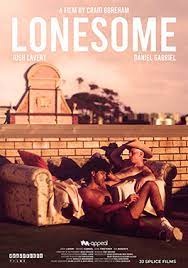
LONESOME
Australia, 2022, 95 minutes, Colour.
Josh Lavery, Daniel Gabriel, Annie Finsterer, Ian Roberts.
Directed by Craig Boreham.
An Australian cinema perspective on gay men and gay issues. Attitudes have changed over the last 50 years but gay men, many experiencing this in their teens, have encountered ignorance, being disowned by families and their communities, condemnation, often from a religious standpoint. This film dramatises these issues.
The government classification office indicates that this is considered Restricted material, more from the treatment of the themes rather than the issues themselves.
The treatment is Frank and explicit, especially in the first 20 minutes, sexual activity, hedonistic activity in chance encounters. Some audiences may have difficulty with the male body, cinema traditions restricting depictions making it is still something of a to boo. It is not to boo in Lonesome.
Clearly, Lonesome is a film for the gay community. But it offers a story, not necessarily new or unfamiliar, of a young man, initial experience in the New South Wales country town, a relationship with a married man, denunciation, disowned by his father, having to leave home, arriving in Sydney.
The initial impression is his contacts and sex. This is aided by social media, dating sites and rendezvous sites, like Grindr.
An encounter introduces him to a young man, Tib, who allows him to stay in his unit, share some jobs, carrying furniture, gardening work. The sexual activity leads to something of a relationship, some happy moments at the beach, but misunderstandings, clashes. And Casey, blaming himself for the past relationship, (over dramatising it in the telling) leads to his lowering his self-worth.
And, again, wandering the city, checking the dating sites, this leads to a graphic experience of self-loathing, introduction to a dominator sado-masochistic group of older men that could entrap him.
Lonesome is not an Australian word. Rather, the references to anti-war holes 1960s gay film, Lonesome Cowboys, and Casey takes on a kind of cowboy persona, especially the cowboy hat.
The gay issues are still very current. Concerned parents, concerned teachers, counsellors, may find Lonesome offering keys to their concerns.
- The title, not an Australian word, American, associated with Andy Warhol and the gay classic film, Lonesome Cowboys?
- The film with gay characters, a gay perspective on the characters?
- An Australian gay film, the introduction to Casey, cowboy hat, style, walking the New South Wales country roads, getting lifts, sexual encounter at a truck stop, arriving in Sydney? The screenplay gradually filling in the background story, his relationship with a married man, his telling that the man had driven his truck into a semitrailer, killing both, a suicide? The later revelation that the man was still alive, phoning Casey, warning him off? And the gradual awareness that Casey’s mother was concerned, telling him to keep away from the town, the condemnation by his father, everybody in the town knowing about the relationship? The effect on Casey and his leaving town and going to Sydney?
- The film’s presentation of sexual activity, graphic and explicit? In context? Contributing to the portrait of Casey, his character, relationships, casual, hedonistic, opportunistic?
- The significance of websites, Grindr, his having links and addresses to go to in Sydney, his entering the birthday party and stealing the food and drink, his going to the Grindr address, participating in the sexual activity? His going to the second address? Again the activity, joining in? But staying with Tib?
- Tib, his background, the audience seeing his angry father and his little brother smashing the eggs, the story about his mother, evicted from Australia, to trying to arrange for her visa to return? A gay man, casual relationships, many? His offering Casey a place to stay? Their sexual encounters contrasting with the domestic sequences, cooking breakfast, Casey on the couch? And their going to work, carrying the bed upstairs, going to work in the garden, Tib’s interpretation of the woman and sexual longings, Casey approaching her, her resistance, his apology, discovering that Tib reminded her of her absent son, Casey later telling Tib?
- Tib, the clients, the invitation to Casey, the scene of the choking, Casey attacking the client and ousting him, Tib upset, his listening to Casey’s phone calls, the clash, the fight, Casey leaving?
- Wandering the city, the address for the sadomasochistic gathering, the owner, taking Casey in, the meal, the Dominator aspects, Casey going to the meeting, humiliation, sexual activity, Casey saying he enjoyed it, but his feelings of self-loathing and deserving such humiliation? His decision to stay?
- Tracking down Tib, going to see him, the reconciliation, a relationship beyond mere sexual activity, Casey and some greater self-appreciation, a future?
- The contribution of this kind of film to the wide audience understanding how gay men have been ignored or condemned, disowned? And the graphic aspects of the film indicating to the audience what their lives could be like?
Cocaine Bear
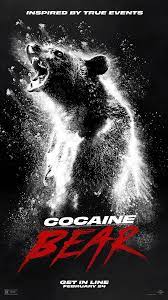
COCAINE BEAR
US, 2023, 95 minutes, Colour.
Keri Russell, Alden Ehrenreich, O'Shea Jackson Jr, Ray Liotta, Isiah Whitlock Jr, Brooklyn Prince, Christian Convery, Margo Martindale, Jesse Tyler Ferguson, Aaron Holliday.
Directed by Elizabeth Banks.
Now there’s an oxymoron! Cocaine Bear.
Back in the 1970s, there were a lot of popular thrillers with horror touches, animal menace, kingdom of spiders, empire of ants, and out in the American forests, Grizzly, King of the Grizzlies. They don’t make them like that anymore – except that this one, in its way, highlights the escapades of a queen of the grizzlies.
At the opening of the film, there are two quotes from Wikipedia about how to handle a situation when confronted by a black bear or by a brown bear. And then it tells us that this film is based on true events. True? Real? So, back to Wikipedia to check. Yes, there was a drug dealer called Andrew Thornton, he did die when his parachute failed, his plane was carrying a lot of cocaine, it disappeared over the Chattahoochee State Forest. And, apparently, four months later, 1985, there was a news report that a bear had died of an overdose of cocaine.
So here we are with the cocaine bear. Did this all really happen? Screenwriter, Jimmy Worden, is quoted: “my twisted fantasy of what I wish actually happened after the bear did all that cocaine.” On that we can probably all agree.
Cocaine Bear is billed as a horror comedy. By and large, the comedy prevails, and provides a context for the horror, such as it is, continual bear menace, attacks, gory moments, severed limbs… So, it would all depend on your sense of humour. Actually, when you think of it (and possibly as you watch it) it does seem all a bit corny. And we are introduced to a wide range of characters most of whom would not ascend very high on the IQ scale. First of all there is Andrew Thornton himself, on a mad spree in his plane, throwing out the bags of cocaine, accidentally hitting his head and falling, parachute not opening, to his death.
There is the local sheriff, Bob, Isaiah Whitlock Jr, who has been after the local dealer, Syd (Ray Liotta in his final performance, giving it all his sneering and menacing best), who becomes a comedy target with his passion for dogs. There is also Syd’s son, rather a softy (Alden Ehrenreich) and his buddy, Eddie, who is Syd’s local representative, O’Shea Jackson Jr. Not a lot of smarts here.
On the other hand, there is a local nurse, Keri Russell, her precocious daughter and her schoolfriend, who wag school to go into the forest to find a secret waterfall and find the cocaine instead, jokes about cocaine, and then the bear arrives! Veteran Margo Martindale provides some dumb comedy as the local ranger flirting with one of the officials, and a gang of even dumb and dumber would-be thugs. who encounter Eddie to their physical more than discomfort!
Mother comes searching for the children, joins with the Rangers, gets tangled with the dealers, so does Bob he sheriff, and his treacherous deputy, and some shootouts all round.
All the time the bear, wandering in and out, menacing, attacking, plus all the time inhaling huge amounts of cocaine, instantly addicted.
A lot of audiences have found it very funny. Depends on your sense of humour. However, this reviewer did suddenly found himself laughing out loud at one particular scene involving the bear going to sleep. You may enjoy this moment and look favourably at the rest.
So, a comedy pastime, not one for the long memory.
Black Crab/ Svart Krabba
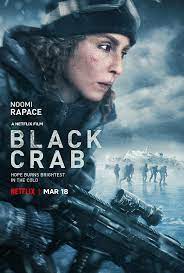
BLACK CRAB/ SVART KRABBA
Sweden, 2022, 114 minutes, Colour.
Noomi Rapace, Jakob Oftebro, Das Salim, Erik Enge, Ardalan Esmaili, David Dencik.
Directed by Adam Berg.
Over the years we have seen many war films with special operations, a select group, commissioned, dangers, a life or death mission. These have been very popular in war times, especially World War II.
However, here we are in the future, a suggestion of the post-apocalyptic atmosphere, the familiar look of contemporary cities but explosions, military, terror for the citizens, cars opened and people dragged out, military bases. The film creates and sustains its atmosphere.
This is a Swedish production, starring Noomi Raplace who once upon a time was The Girl with the Dragon Tattoo or, rather, thrice upon a time, making her mark in world cinema and extending her career beyond Europe to the US. Here she is back, more than a decade later, in her native Sweden. At first we see her as Edh, a mother with her young daughter in the car, then the daughter dragged away, then she is in uniform, herded into a crowded train, ordered out, taken to the base, an interview with the leader, told she has a special mission along with five other people because she is skilled at skating and understands ice and its limits for skating.
The mission is to take some capsules behind enemy lines to the rebel headquarters, something which will change the fate of the war. They escape, especially at night, more than 100 km, life and death.
There is some beauty at times and the photography of the skaters on the ice, long shots, aerial shots, close-ups. As might be expected, there are many difficulties, snipers, helicopters, the skaters hiding, one falling through the ice, another wounded, meeting an old couple in a house who seemed folksy but then deadly, an attack by enemy soldiers and defence with guns and grenades, and more deaths.
There is complexity as one of the members of the group is under suspicion, especially by Edh, his behaviour with her previously.
When the nature of the capsules is revealed, there is a conflict between obeying orders and not obeying orders.
After the trek on the ice, there is substantial part of the film in the headquarters, in the hospital, recoveries, in the laboratories, and action decisions to be taken about the capsules.
A different mission operation story, which also raises issues of war, and moral issues about weapons.
- The title, tones, crab walking and the operation, the operation itself?
- The time, future war, civil war, the cities and attacks, the headquarters, on the roads, military bases, the operation on the ice, the islands, the house, the final destination, the laboratories? The musical score?
- Edh and her story, in the car with her daughter, the music, the explosions, the daughter’s fear, taking shelter, dragged from the car? Edh and her memories throughout the film, the flashbacks, the happy times with her daughter? Edh, military, in the train, summoned, in the car with an island, the journey, his stop off, the attack and her driving away? To the headquarters, waiting, the other candidates, the meeting with the commander, the mission, their qualifications, to get the capsules behind enemy lines to the other headquarters?
- The minimal briefing, the nature of the mission, the ice, too light for vehicles, too heavy for ships? The dangers, behind enemy lines, in the light, in the dark? Their equipment? The morale boosting, that this would save the war? And Edh being promised to see her daughter?
- The team, characteristics, Malik, Granik, young, Karimi and willing, his girlfriend? The leader and her tough stances? suspicions?
- The drama on the ice, the skating and equipment, the long shots, the aerial shots, the beauty of the skaters on the ice? The succession of events, being shot at, taking cover, the icebreaking and the leader falling through the ice, and Edh rescuing the capsules and leaving her? In the house, the old couple, the machine gun under the table, the shootings, Karimi and his death, the later radio contact from his girlfriend, that he was telling the truth about his call to her? Malik, discussion about the furniture and the antiques? His being wounded, left, his shooting himself?
- The helicopters, the surveys, their being shot at, hiding? The attack on the island, the destruction of the house, Granny and Edh shooting, the grenades, and Granik being killed by the grenade? The pathos of his telling his story about his young days, deaths and torture, his training?
- Suspicions on the island, the completion of the mission, the revelation about the truth of the capsules, a virus? Obeying the law, Nylund wanting to get rid of the capsules? Edh pursuing him, shooting him, collapsing on the ice, her being recovered?
- In the laboratory, losing her toes, the wounds, rehabilitation? The ceremony, the medals? No island present, the broken arm? He is receiving the medals?
- Edh, wanting to see her daughter, the tantrum, her attack on the officer?
- The contact with Nylund, Edh and her change of heart, wanting to destroy the virus, working together, through the corridors, the guard, taking his card, entry to laboratory, the guns, the loyal worker and her denunciation, the fearful worker, leading them to the virus? Setting the alarm?
- Edh and Nylund with the group, the evacuation, the being taken, the grenade, the previous use of shooting and grenades? Her holding it, Nylund and the helicopter, her nodding for him to go, the threat, throwing herself off the wall, the explosion and the destruction of the virus?
- The final image of Edh and her daughter, United underwater?
- A parable about war, civil war, weapons, tactics, virus and disease as a weapon?
Transfusion
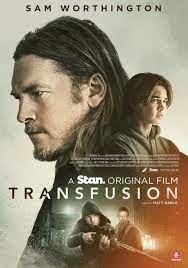
TRANSFUSION
Australia, 2023, 106 minutes, Colour.
Sam Worthington, Edward Carmody, Phoebe Tonkin, Matt Nable, Susie Porter, Jessica Napier, Gilbert Bradman.
Directed by Matt Nable.
Matt Nable was a professional rugby league player for many years of his life, then moved into acting as well as writing. With this film he is writer, director, actor. He has made an interesting if rather unexpected in its development contemporary story. And, with a focus on father and son, it is a universal story.
The film is set in Sydney, sometimes photographed to great advantage, the city, the harbour, the beaches. But, it has an opening sequence in Iraq, Sam Worthington as Ryan, with Matt Nable as Johnny, a particular mission, the apprehension of a suspect in tunnels, some shooting, Ryan injured, needing a transfusion.
Transfusion is certainly an arresting title but sometimes we might be wondering why the film is called transfusion. Soon we will find that Ryan’s wife and young son, Logan, are injured in a car accident and each needs blood, but there is insufficient at hand for the necessary surgery. Ryan has to make a decision.
Which means that most of the action takes place after the engagement in Iraq. Ryan has left the Army, is devoted to wife and son, a young boy, with a gentle touch, his father taking him hunting, showing him how to shoot a deer with a rifle but the boy says no. Later, Ryan will affirm his son’s decision as an act of bravery and conviction. Then the accident happens. Johnny is very supportive at the hospital.
But, most of the action takes place eight years later. Ryan is much the same, trying to do sales work, being insulted by shop proprietors, and fighting back, taken to task when the proprietors complain, losing his job. And, it would seem that he has lost Logan as well, skipping school, running away, no friends. (The boy who acts Logan as a teenager, Edward Carmody, looks very much like the young actor who portrayed him at eight, Gilbert Bradman, excellent continuity.)
So, this very much becomes a film of tensions between father and son, visits to the principal of the private school, Logan promising his father to behave better, his being the butt of jokes from a group at the school but their leader befriending Logan, taking him on as part of the group despite the mockery of the others, inviting him to a party – and putting Logan behind the wheel of the leader’s father’s expensive car. And, we might expect what happens.
But, there is complexity and the consequent drama, Ryan speaking to the father, offering money in compensation for his car, to cover what actually happened. And then it gets more than tangled in Johnny’s escapades, including robbery, sniping, a gang, fighting for himself, fighting for his son, even confronting Johnny.
But, there is a humane touch throughout the film, Ryan’s wife continually appearing to him, his talking with her, her being a guide, a conscience.
An interesting local drama, unexpected in its crime aspects, important for relationships between father and son.
- An Australian story, universal story?
- The work of Matt Nable, writing, acting, directing, his football background, military background?
- The opening, the war in Iraq, the soldiers, the mission, the dangers, confrontations, ambush, partnerships, Ryan being wounded, needing a transfusion?
- Ryan, after the war, relationship with his wife, devotion to his son? The son’s age? The hunting sequence, the rifle, the deer, Logan refusing, his father praising him for his conviction? The nature of bravery? The picture of the happy family?
- The accident, the drunken driver, hospital, the need for blood transfusions for wife and son, not enough blood, with his wife, Johnny and his visits, support? The decision, the death of his wife, the survival of his son? His son and the scars on his face, and his feeling that his father resented his survival because of his wife’s death?
- The significance of Ryan talking with his wife, her appearances, Logan hearing this and questioning his father? The appearances of his wife as guide and conscience?
- Logan, a teenager, skipping school, running away, the visit with the principal, the fee for the private school, Logan and his being ridiculed by the group? His returning to school, promise to his father? Standing up to the group, the leader supporting him, the others and their mockery? Talk about his father? The invitation to the party, asking his father, permission, going to the party, drinking, enjoying the friendship, going for the drive, the father’s lavish car, forcing Logan to drive, the crash, the car overturned? His phoning his father, his father coming, the confrontation with the boys, moving the car to the beach, burning it?
- Ryan, trying to do the honourable thing, always polite, going to visit the boy’s father, solicitor, his car, the plea to take the payoff, the arrangement for the meeting, Ryan paying the man?
- Johnny, his reappearance, his character, military, wounds during the war, eye and face? The business tangles, the group, dealing, the cash, doublecrossing them? Appealing to Ryan, the robbery, the safe, the shooting and the death? The consequences for Ryan?
- Appealing to Johnny for the cash for the payment of the car? Johnnie and the revenge on the drunken driver who killed Ryan’s wife.
- Logan, continued exasperation, but relating with his father?
- The buildup to the confrontation between Johnny and Ryan, his wife’s presence, the right thing, being persuaded to act as the sniper, shooting the thugs? The pursuit of Johnny, of Ryan?
- The fight between the two friends, disillusionment, Ryan standing up for what was right? The issue of the money, rugged and stolen money?
- Rescuing his son, their quietly drinking together at the end, the future?
Watcher

WATCHER
UAR/US/Romania, 2022, 91 minutes, Colour.
Maika Monroe, Karl Glusman, Burn Gorman, Madalina Anea.
Directed by Chloe Okuno.
This is a 90 minute slow-Burn psychological thriller. Audiences who enjoy this kind of film will find this one satisfying. Those who want instant and all continuous action, will have to wait until the end!
The original screenplay for Watcher was set in Brooklyn. However, it has been transferred to Bucharest and filmed there. This makes quite a difference to the drama. The central character is Julia, who has married Francis, a businessman whose mother was Romanian and an opportunity arises in Romania for him to work there. Julia accompanies her husband. She is played by Maika Monroe. He is played by Karl Glusman. There watcher of the title is played by Burn Gorman, often sinister presence in films.
The audience identifies with Julia and, if they do not speak Romanian, they will share her difficulties in understanding and not understanding, and people speaking without reference to her, sometimes some translation, sometimes some explanations. This adds to her bewilderment in being in a strange country – and to the bewilderment of the audiences sharing her experience.
All seems normal enough. Julia wanders around the city, prepares a meal for her husband and his colleague and wife, goes to socials. She does become involved with some of the people on the floor, a landlady who is searching for her cat, noise from the adjacent apartment, a prostitute, Irena, who also works as a stripper. They become friends.
In the background are media reports about a serial killer.
The film is something of a reversal of Hitchcock’s Rear Window, the observer, the watcher, but the main focus is on Julia, more of the title of “Being Watched”. She experiences the watcher at a cinema (going into watch Audrey Hepburn in Charade), his presence in the supermarket, her waving to him and his waving back, finding him at the strip club as a cleaner, her fears, going to his apartment door in finding an old man answering, then seeing the watcher, his getting the police to accuse her of stalking him.
Julia becomes more paranoid, more wary. Ultimately, there is some violent action as she discovers Irena’s body, is attacked by the watcher, stabbed, finally confronting him.
A not unfamiliar scenario, but this one quietly achieves what it set out to do.
- The title? The focus on Weber as watcher, revealed as serial killer? The focus of the title, being watched, Julia observed?
- The original screenplay in Brooklyn, the effect of transferring to Bucharest, the issue of language, no subtitles, Julia not understanding except for a few words, the audience not understanding and sharing her difficulty? The sensitivity of the Romanians, others insensitive to Julia’s difficulty? The effect of bewilderment for Julia and for the audience?
- The cinema influences, the various thrillers of people looking out windows, observing? Hitchcock and Rear Window? But, this time, the action concerning the person being watched? The victim of the watcher?
- Julia, American, love for Francis, arriving in Bucharest, his job, her being at home, the difficulties with language, coping, going out, the streets, buying the Dracula statue, the neighbours, upsets, the landlady searching for Elvis the cat, the noise from Irena and her clients on the other side of the wall? Francis having his colleague and the wife to the meal, their talking, making jokes, her sensitivity, upset? Meeting Irena, their friendly talk, her background, support? Irena’s ex and his coming to the door? Her ignoring him?
- Julia, observing the watcher, in the opposite building, the silhouette, the light behind him, the curtain open? Her eventually waving, his waving back – and the consequences as he explains someone acknowledging him? At the cinema, his moving to the seat behind her, her leaving, the supermarket, his presence, upset, running out the door, escaping? Explaining to Francis, the police, looking at the surveillance footage? At the strip club and finding him as a cleaner? Irena’s ex, his visit, Julia asking him to accompany her, going to the building, knocking on the door, the old man emerging? Weber and his arrival? The police, arriving at the flat, Weber accusing Julie of stalking? Their agreement for peace?
- The social, Julia upset, Francis and his exasperation, her leaving, the taxi? At home, the noise, going to Irena’s apartment, discovering her decapitated body, not looking in the cupboard (though the audience wanting her to look in the cupboard), Weber and his attack on Julia, the erotic aspects, his loneliness, his father, expectations? Her fight, her neck slit, on the floor, the blood, his watching? Lying gazing at her? His leaving, Francis arriving home, bewildered, the phone and its ringing in Irena’s apartment, his coming to the door, opening it, Weber shot by Julia – and the past story of Irena explaining the gun in the desk drawer?
- A satisfying slow-burn psychological thriller, the victim, not being believed, paranoia? The watcher, the background of the newspapers, television, the serial killer?
Living/ 2022
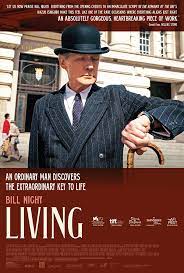
LIVING
UK, 2022, 102 minutes, Colour.
Bill Nighy, Aimee Lou Wood, Tom Burke, Alex Sharp, Adrian Rawlins.
Directed by Oliver Hermanus.
For this reviewer, Akira Kurosaw’s 1952 drama, Ikuru/ Living, is one of the great films. And, it is a great film about terminal illness, discovering the meaning of life, and a critique of humdrum bureaucracy. And this is true of this British remake, British interpretation of this universal story. This remake has the advantage of building on the 1952 film but with the help of Booker-prize-winning author, Kazuo Ishiguro (Remains of the Day), it has a strong literary quality as well.
This film looks very much like a film of its period, 1953, the year of the coronation. It opens with a great deal of contemporary footage of London itself, the familiar streets, the landmarks, the red double-decker buses, people going to work or shopping, the clothes of the time, the cars… It is strange to think back that this was what life looked like for so many people in England 70 years ago.
The tone is set at the local railway station, the young man, Peter (Alex Sharp) suit, tie, bowler hat, joining all the other men at the station, in the carriage, quiet, proper. And then a ritual of standing back for their boss, Mr Williams, to enter the building, then to take up their places around the desk, their piles of documentation (they call them pyramids), Mr Williams quietly sitting at the head of the table – and a glimpse of Margaret (Aimee Lou Wood), the young woman who seems rather out of place with these bureaucrats.
However, this is Mr Williams’ story. Bill Nighy received an Oscar nomination for this performance, an acknowledgement of his long and strong career. He has a distinctive presence, look, voice, but has use them in quite a variety of roles (even to pop singer in Love, Actually).
Mr Williams quietly absents himself from the office, sits stoically in his doctor’s office to hear the results of tests, only a few months to live. Mr Williams is under criticism from his daughter-in-law at home, wanting money to invest in a house, his son under the dominance of his wife. He decides not to tell them about his health. But, what is he to do? He travels quietly to Brighton, overhears a young rather Bohemian artist talking about freedoms (a cameo by Tom Burke), interrupts him and joined him for a kind of 1953s night on the town or, rather, a night at the pier. Mr Williams drinks, observes, is sick, but takes the opportunity to acknowledge his Scots ancestry and sing, so sadly, Rowan Tree.
But, he continues to absent himself from the office even though he is dressed and everybody thinks he is going, he encounters Margaret who has taken up a new job at one of the Lyons Corner Cafés. On a whim, they go for a lavish lunch at Fortnums. She actually tells him that she had a nickname for everybody in the office and that his was Mr Zombie. He is quietly bemused. But, her cheerfulness cheers him and they spend the afternoon in London, the galleries. And, there is a later encounter with her, much more dramatic, much more sad, his confiding in her and her quietly tearful response.
When Mr Williams returns to work, he has some zest, a purpose in life to help some ladies who want to build a playground on a bombsite and have been given the runaround, literally, of all the bureaucratic departments.
There is a jolt as the screenplay takes us to Mr Williams’ funeral. And wondering, at the moment, whether the projectionist has lost a real of the film. But, the device is to look back at what happened to Mr Williams, his change of heart, his work for the ladies, his standing up for them, defying the authorities, clearing the bombsite, the building of the playground. And the bureaucrats all agreeing that he had done something wonderful and that they should follow his footsteps, be like Mr Williams. (Spoiler alert, they don’t.)
Mr Williams sang Rowan Tree early in the film – and, at the end, in the snow, on a swing in the playground, he sings it again.
We share in the pathos of Mr Williams growing old in his restricted life – but rejoice in his discovering his humanity.
- As a stand-alone film, portrait of a humourless civil servant, the 1950s, terminal illness, taking the opportunity to live and redeem himself?
- As a remake of the Japanese classic, released in 1952, the Japanese post-war setting, the central character, bureaucrat, illness, living? The contribution of novelist, Kazuo Ishiguro?
- The recreation of Britain, 1953, the opening credits, the film footage of the time, London, the streets, the buses, the people, clothes and fashions, cars, shops? The period of the coronation? The bureaucracy and offices, the streets, Fortnum is, Lyons Corner Cafés, Brighton, the pier, the entertainment on the pier? The bombsite for the playground? Clearing, building, the completed playground? The musical score?
- The opening with Peter, young, going to work, the steam trains, the railway station, the civil servants in suits, bowler hats, reticent, and the train carriage, minimal conversation, deferring to Mr Williams, arriving at the office, his entering, going to the office, the seating arrangement, documentation, the pyramid of documents, the formalities of their work, the conversation, the touch of smoking, presided over by Mr Williams? And the happy presence of Margaret Harris? Her prospect of the new job?
- The method of the various departments, their requirements, passing one onto the other, leaving the documentation in the pile, deferred? The arrival of the ladies, the complaint, Mr Williams sending Peter, the complete runaround during the day?
- Bill Nighy as Mr Williams, his age, appearance, serious, lacking humour? Presiding over the others, deputising? Leaving early, the visit to the doctor, the prognosis? His response? Going home, overhearing his son, his daughter in law complaining about the money, sitting in the dark, wanting to speak, his son being bossed about by his wife, Mr Williams not communicating? Some moments of flashback, to his boyhood, cricket, military service? No detail about his wife?
- Going to work the next morning, not going to work, the character of Sutherland, in the diner, his discussions about Paris, creativity? The waitress? Mr Williams interrupting, talking with Sutherland, some empathy, Sutherland taking him the rounds of the pier, the various types of entertainment, drinking, getting the rabbit a surprise, the dancing, his being sick? The pathos of his singing Rowan Tree, Scots ancestry, memories of his wife? His gratitude towards Sutherland?
- Going to work but not arriving, wandering, the encounter with Margaret, their talking, her cheerfulness, getting her new job, going to tea at Fortnums, the conversation, Mr Zombie and his bemused response? Going to the Gallery, the afternoon? The gossip seeing them in Fortnums?
- The gossip, talking to the daughter-in-law, her complaining to her husband, gossip in the area, the meal, the tension, the son not commenting?
- The further meeting with Margaret, at her cafe, flat out at work, later having the tea, his confiding in her, her tearful response, going home?
- Mr Williams returning to the office, the other men, his gathering them up, leaving Mrs Johnston in charge and her being pleased with this trust, confronting the other officials, sitting and waiting? Gathering the group, the rain, the going out to the bombsite?
- The dramatic transition to his funeral, the long tracking to the photo on the coffin? The aftermath of the funeral, comments about it? The various members of the office, Sir James and his compliments? Margaret present? The son, talking to Margaret, reticent, trying to find out whether his father knew that he was terminal, and why he had not spoken to his family? Margaret’s tears?
- The members of the office talking about Mr Williams, their reminiscences? And Mr Williams now seen in the flashbacks? The men, their resolution not to be bureaucrats, to be at service, in his memory, his influence? Peter and his agreement, his dismay at finding them simply repeating their old habits and relegating documents?
- The various memories, going to the bombsite, Mr Williams being moved, the memory of his meeting Sir James, the refusal, his confronting him, winning? The various details of the demolition, the building of the playground? Memories of his indicating that he might not see the finished playground?
- Peter, the bond with Margaret, the letter from Mr Williams to him?
- The finale, the playground, the young constable, talking with Peter, the memories of the children playing, and Mr Williams sitting in the rain, singing Rowan Tree?
- An image of Britain, the prim and proper aspects, bowler hat in suits, bureaucratic reticence of that past? And yet the possibility of change, on a very small scale, but full of humanity?
The PNG Provincial Chapter, 3-11 February
The PNG Provincial Chapter, 3-11 February

With thanks to Roger Purcell MSC.
Provincial old and new: back, Sylvester Wakakai (new), John Willio (previous), front, Gabriel Endo, Ed Meli, George Tami.

Secretariat

Provincials old and new, with first bishop, Louis Couppe
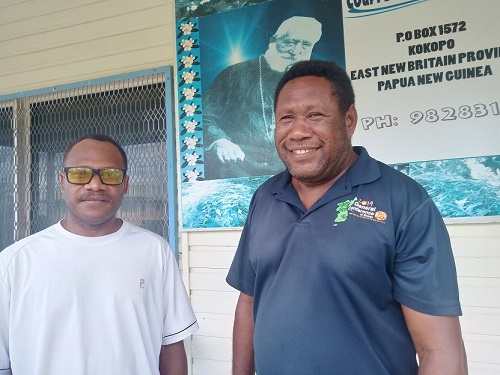
Discussing recommendations

The Group of Delegates

Roger writes: I facilitated the Chapter and found the group to be very mature, sensible and hardworking.
Profession at Vunapau just before the Chapter.
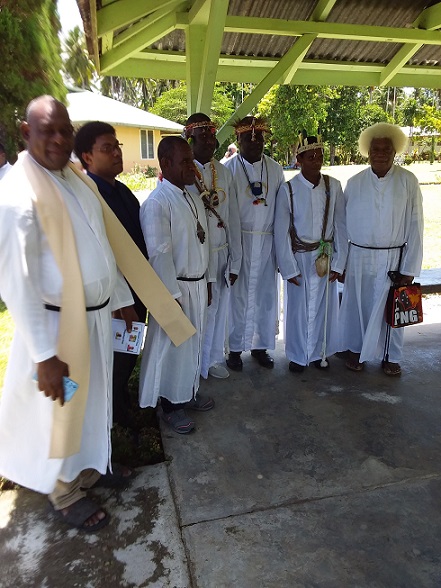
3 newly professed novices, 1 final vows and 1 renewal of vows.
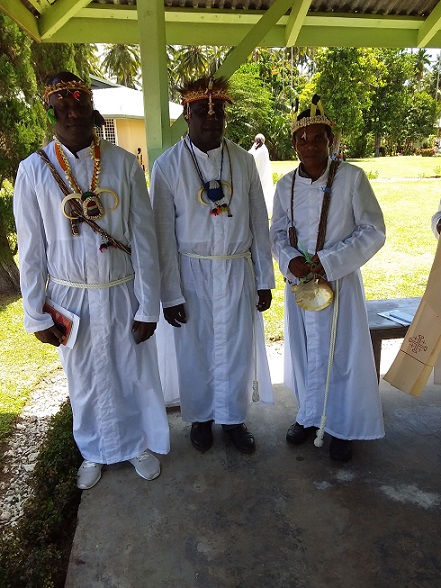
Chapel at Vunapau.
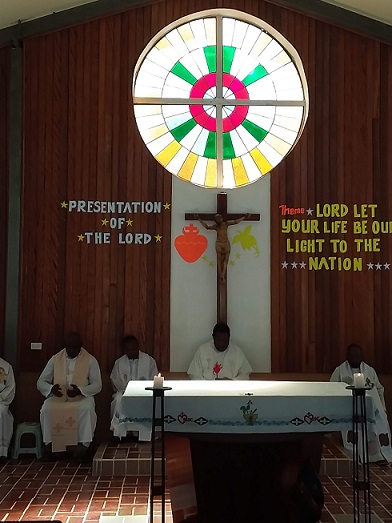
Paul Cashen MSC: Homily for the Profession Anniversary – and John Franzmann MSC
Paul Cashen MSC: Homily for the Profession Anniversary – and John Franzmann MSC
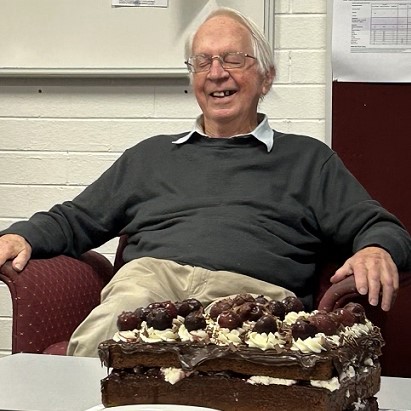
No, that is not a photo of Paul Cashen. It is John Franzmann enjoying a quiet anniversary celebration at Chevalier College where John has lived for many years – decades. Scroll down to the end for a photo or two more. Thanks to John Mulrooney.
He and the others who celebrated have lived what Paul Cashen describes in his homily. This is Paul delivering his homily.

When we began to live religious life there was an emphasis on rules and regulations, set out clearly for those who entered the novitiate 61 yrs ago, or for Jim and Kevin (76 yrs ago) and so many others who trod the road before and after us.
The initial task for each of us was to over come our human weaknesses, and thus to live a perfect life in response to the mission ahead of us. What we heard was an ideal, described by the psalm today; “A pure heart create for me, O God“ Ps 50.
On average we were 18 years old when we began to try to be “perfect”. The efforts we undertook to be “perfect” soon caused us to stumble because of the difficulties we were not able live up to. Our human condition was deeply imbedded in our lives, and so we ran into the ideals of “perfection”; or the rules and regulations left no room for us to adapt to our everyday lives.
Jesus reached out to all people female or male, young and old, the sick and even tough fishermen. His presence revealed a new and different understanding who we are. He revealed to us a different relationship between God and us humans! Jesus challenges us to see things differently in Matthew’s gospel. 4/1-11
For example, Jesus first response to his tempter was that ‘The human race cannot live on bread alone!’ After his time in the desert Jesus teaches us to consider our attempts to do the “right thing”. He identified that human experience leaves us floundering in the disappointments of personal failures based on the “law”.
This is how it plays out in reality! ‘Bread’ is often seen the most basic necessity when we consider the struggle to survive though earthquakes and floods and rockets of destruction. The lesson Jesus reveals to us is that a loaf of bread (or a huge grant of money) is not a substitute for a being there for those who suffer; a hug, an embrace, a look of understanding and affection, these are the “words that come from the mouth of God”.
The second “teaching” that Jesus has for us, announces that it is our personal support and care and love for each other that matters. As I look back on those early days of religious life, it was my brother MSC who supported and cared for me, especially during the novitiate, and then through the years of the seminary. The move into philosophy and theology opened another world for us! We lived in a type of desert, the Canberra lake was only beginning to fill and in the isolation at Croydon we escaped to the mountains on bikes and foot to be survive the rules and regulations. There were times when we put the ‘Lord your God to the test.’ However, in those days it was not the feats of endurance to escape from the seminary that were priorities, it was the presence of those around us. They inspired us to stretch our personal limitations, encouraging us to reach out into the world around us. I recall a discussion that engaged us about our “faith in God”.
As we shared our reflections it was agreed that this faith begins not with the words of theological debate, trying to prove or disprove the presence of God. Rather we discovered that we were more comfortable with the faith begins with the love and care we received from our families and each other. The challenge of “putting God to the test” was best described as ignorance of the love God had given to each of us in our nurturing and God’s encouragement for us.
The third test I suggest relates to our own desert times. This occurred often at the height of our careers. Personally, it is an experience has happened to me a number of times, without counting too closely. It happened when we are challenged by God to get off our pedestal (or out our pulpit) to accept the fact that it is God’s call, not mine, that is at stake. This revelation might seem easier to accept the older we get, but each experience ultimately reveals God’s care. This has been repeated and repeated many times. God’s presence is revealed in the love each of us receives. In identifying the love God has for us, we are able to “acknowledge God’s goodness to us and thus we can serve him alone”.
The “formation program” has changed over the years and it challenges us today. Pope Francis has called on priests and religious to reflect on what God is asking of them today.
Our question is “how we have got to where we are after 60 or more years for some of you?” It has been asked again and again, but now “how do I respond to God’s call today?” At present Paul McCormack, Peter Hearn and me, make up the community in Adelaide. Having left Henley and Hindmarsh parishes we have the challenge to reflect together about what is God asking of us? It could be OK I suppose to rely on the fact that age makes it difficult to take on responsibility. But do we drop out of ministry? I’m sure that will come with time anyway. However we are trying to work out what is God’s call for us at Croydon in Adelaide?
Returning to the call to the heart, I sum up in the three challenges of the Gospel of today:
- the first is to reach out to others and to listen and support each other;
- the second is to trust that together we will sort what we are called to do, by listening to each other;
- the third, is to thank God for who we are; our mission is to bring the Father’s love into our world.
As promised earlier!
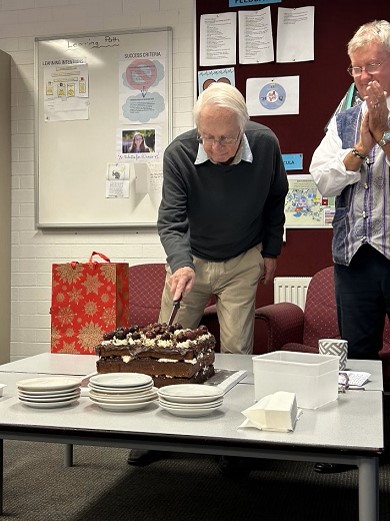
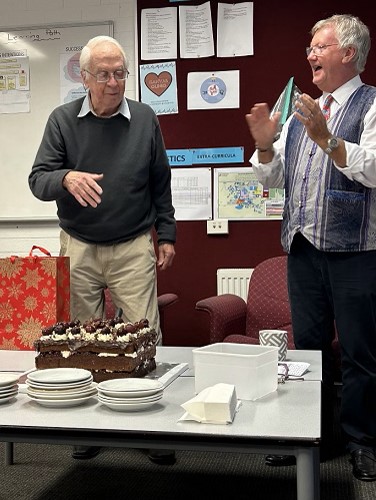
Monday morning Province photos
Monday morning Province photos
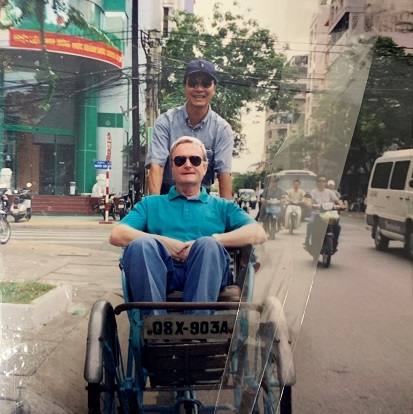
First one to catch the eye - the good old days in Vietnam with Bob and Thoi

The good new days in Vietnam with Gene Pejo arriving from the Phiiippines for formation work

and Mass with the community
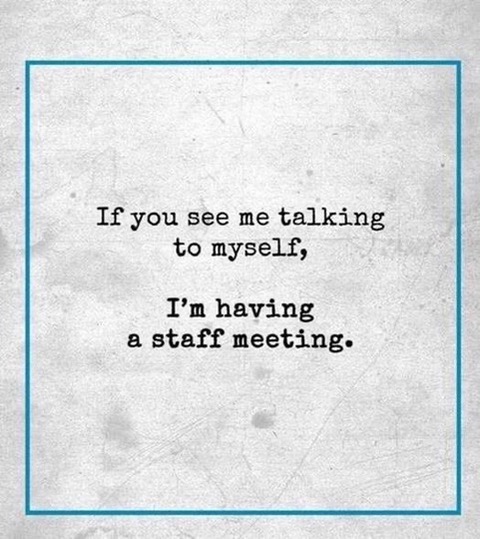
MSC Education meeting

plus member, Barry Smith
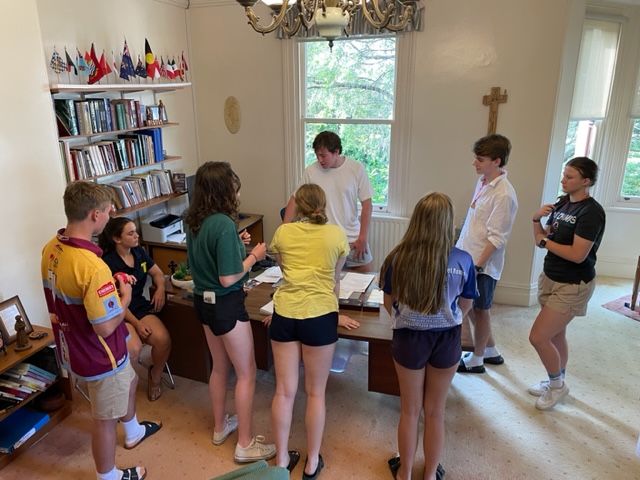
And a recent tradition where some senior Downlands students visit Sydney, Douglas Park and Chevalier
